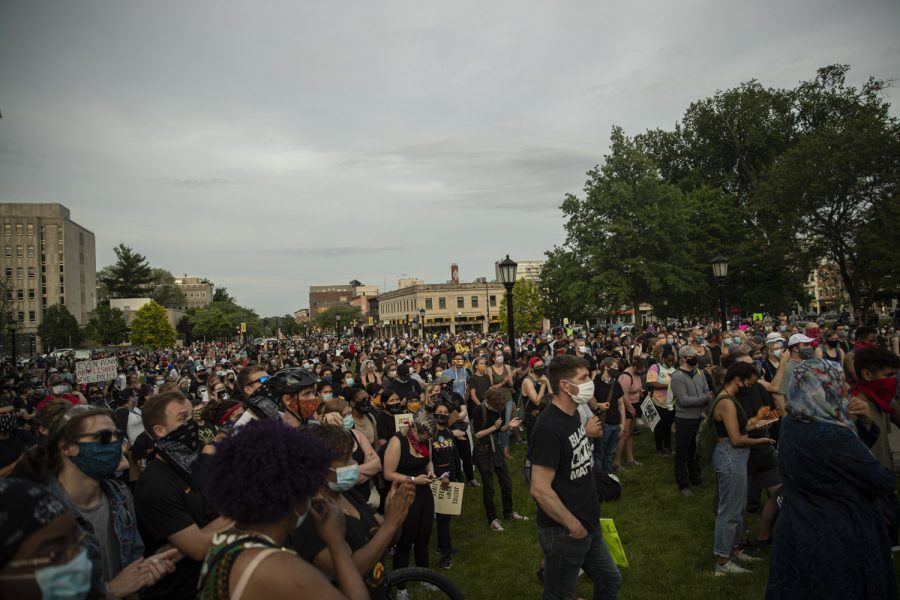University of Iowa global-health experts offer protesters preventative tactics against COVID-19
University experts in global health have advised Iowa City protesters to wear masks and wash their hands regularly to prevent the spread of COVID-19. Cleaning things like protest signs after a march is the key to preventing infection, they say.
A crowd gathers on the Pentacrest to listen to speeches from organizers and elected officials from the city, county, and state levels prior to a march to support the Black Lives Matter movement and protest police brutality on Saturday, June 6 in Iowa City.
June 14, 2020
As Iowa City protesters continue to gather and march in large crowds, University of Iowa experts say that maintaining the recommended six-foot distance between individuals to prevent the spread of COVID-19 may be a challenge. However, protest attendees can still mitigate the novel coronavirus by covering their faces and washing their hands.
Katherine Herz and Christine Brunner Luse, UI Global Health Studies instructors, have both offered advice to local protesters about how to protect themselves from contracting the virus.
It’s necessary to protect one’s entire face because the long-term effects of coronavirus to the human body have yet to be studied completely, Herz said.
Although the number of Iowans infected with the virus is declining, Luse said there is still potential for a second wave.
A resurgence of COVID-19 cases because of protest crowds is possible, Luse and Herz both said, but it’s too early to know whether that has happened because it can take up to 14 days for an individual to show symptoms.
“If you’re infected from a protest the past weekend, you’ll probably not be showing [any symptoms] yet,” Luse said.
In addition to serious damage to the lungs and heart, Hertz said, the coronavirus impacts the eyes and nose — even causing a loss of taste and smell.
Even if a protestor is young and healthy and not at a high risk of contracting COVID-19, Luse said she fears they may still bring it home to someone who is not. Luse emphasized the importance of wearing a mask correctly because the virus is transmitted similarly to other respiratory diseases. That means keeping the mask on your nose and mouth, she said.
If protesters only cover their mouth, Herz said, the virus can still enter through their nose.
“Even the little hairs in your nose will not always trap all of the viruses,” she said.
The same goes for the eyes. Herz said Frontline health workers use face shields and goggles because the virus can enter the eyes through droplets, so it is necessary to protect the whole face.
RELATED: Iowa City protestors march to City Councilor John Thomas’s home
Individuals should avoid touching the outside of their mask, Luse said, which is the foundation of preventing COVID-19 spread. The mask acts as a barrier to keep the virus out, Luse said. If someone’s hand touches the outside of their mask and then their eyes and mouth immediately following, the whole protective measure becomes meaningless, she said.
Herz recommended that protesters thoroughly clean all items involved in the protests, such as non-disposable masks and signs.
Iowa City protesters like Amadou Sanogo have discovered that adhering to social-distancing guidelines and tasks such as staying hydrated are often challenging.
“I brought a lot of water, so if people need water, I can give them [some] without sharing bottles,” Sanogo said.
Herz said it’s important that protesters wash their hands before and after taking off their masks and try to keep a social distance of at least six feet from the crowd when doing so.
“Being in contact with different people who have some amount of the virus is going to increase … the chances of [everyone else around] getting the virus,” Herz said.
COVID-19 is considered dangerous because people aren’t always symptomatic and the disease cannot be self-identified, Herz said. Symptoms vary from patient to patient with some people getting a fever and others resembling more flu-like symptoms.
Herz added that protesters should use hand sanitizer, which kills viruses and bacteria on the skin and renders them ineffective — in addition to washing their hands with soap.
“Nothing beats washing your hands,” Herz said. “There’s nothing above that rule in public health.”



